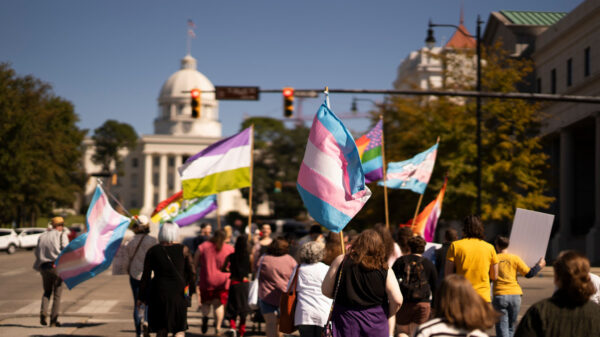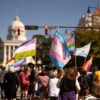What material, exactly, is “harmful to minors?”
HB385 from Rep. Arnold Mooney, R-Indian Springs, would amend that definition under the Alabama Anti-Obscenity Enforcement Act, and dangle the threat of criminal prosecution over librarians who allow such materials to end up in the hands of minors.
But Mooney, several members of the committee who spoke on the bill, and at least one speaker at the public hearing didn’t seem to understand what the bill says.
“This bill would prohibit the state or any library from supplying any minor with material containing sexual content unless the minor’s parent or guardian consents,” Mooney said.
Mooney states that no library could “supply any minor with material containing sexual content.” Mooney presumably conflated “sexual content” with “sexual conduct,” of which a new definition is the bulk of the bill.
The new addition to the definition of sexual conduct, in its current form, would read:
“Any sexual or gender oriented material that knowingly exposes minors to persons who are dressed in sexually revealing, exaggerated, or provocative clothing or costumes, or are stripping, or engaged in lewd or lascivious dancing, presentations, or activities in K-12 public schools, public libraries, and other public places where minors are expected and are known to be present without parental consent.”
The new definition is almost identical to the bill Mooney brought last session, except at that time the bill was framed as being targeted at drag shows in public places and had little to do with library materials.
Regardless, the definition of “sexual conduct” is just a small part of one prong of a three-prong definition of “material harmful to minors.”
As Mooney continued to explain the bill to the committee, he continued to say it did things that are not found anywhere in the language of the bill.
“This bill would prohibit a library from purchasing or accepting donated materials containing sexual content,” Mooney said.
There is no language in the code that would prohibit a library from purchasing or accepting donated materials at all, much less because the materials contained “sexual conduct.”
The law does not outright prohibit entities from obtaining material harmful to minors, as it primarily deals with distributing those materials to minors. However, the law does outright prohibit the display of material harmful to minors at any place where minors are known to be present—including libraries, if the criminal exemption for libraries is repealed. That would mean any material deemed harmful to minors would also be unlawful to display even in the adult section.
“This bill would prohibit any entity that receives state funds from affiliating with the American Library Association,” Mooney continued.
There is absolutely no mention of the American Library Association anywhere in this bill or in the Anti-Obscenity Enforcement Act overall.
Citizen Chris Hathcock spoke in opposition to the bill, and said that the proposed legislation is overly vague.
“We see the phrase ‘material harmful to minors’ used in three places and that’s not defined,” Hathcock said. “Material that is harmful to minors could include anything and who gets to decide what that is?”
“I think the state has a definition for that,” answered Rep. Chris Sells, R-Greenville. “… This legislation doesn’t, but the state has a definition for that.”
The entirety of the bill is based on changing the definition of “material harmful to minors,” and the definition is included in the bill. It can be hard to follow, however, as the main change is to the definition of “sexual conduct” which is a term used within the definition of “material harmful to minors.”
A three-prong test determines what is harmful to minors
Here are the three prongs of the definition of what constitutes “material harmful to minors” (with certain words emphasized in bold italics by APR):
- The average person, applying contemporary community standards, would find that the material, taken as a whole, appeals to the prurient interest of minors; and
- The material depicts or describes sexual conduct, breast nudity, or genital nudity, in a way which is patently offensive to prevailing standards in the adult community with respect to what is suitable for minors; and
- A reasonable person would find that the material, taken as a whole, lacks serious literary, artistic, political, or scientific value for minors.
Those “and”s at the end of the first and second subsections of the definition indicate that all three prongs must be taken together. Mooney’s bill would take those “and”s out; however, the bill also adds a phrase “all of the following” before the subsections.
Othni Lathram, executive director of the Legislative Services Agency previously told APR that language is also intended to require all three prongs to be taken into consideration together, and said the change is actually to strengthen that interpretation.
So regardless of whether a book meets the new definition of “sexual conduct,” it would also have to “appeal to the prurient interest of minors” when “taken as a whole.”
A book simply “containing” material that met the new definition of sexual conduct would not necessarily elevate it to the level of being “material harmful to minors.”
A single passage, or several passages, would not suffice; the book would need to be taken as a whole. In order to be considered “harmful to minors,” the material as a whole would have to “appeal to the prurient interest of minors” and “lack serious literary, artistic, political, or scientific value.”
Take, for instance, “Genderqueer,” a graphic memoir that is the most banned book in America and has roused the ire of several Alabama groups challenging books. Although passages of that book would seem to meet the new definition of sexual conduct, there are many more pages and passages of that book which would not meet that definition. And even within the prong on sexual conduct, it would need to be proven that the material depicted the sexual conduct in a “patently offensive way.”
Lawmakers show intent to punish librarians for providing LGBTQ books
Regardless of whether the law actually would apply to librarians and the recent controversies over what material is suitable for minors, some lawmakers on the committee acted as though the bill is a response to those situations.
“It’s a concern to parents throughout the state,” said House Majority Leader Scott Stadthagen, R-Hartselle. “As legislators we get information and concerns sent to us from constituents year-round and every time there is an incident like this, as a parent, it makes you extremely upset …
“When you bring kids—and yes, it is grooming them—when you bring kids and you are pushing something like this that is sexual intent with a man showing himself as an opposite gender to a child, you are grooming them to be accepting of that. And it is unacceptable.”
Rep. Ernie Yarbrough, R-Trinity, said he had received texts from “several moms” who have had children exposed to “sexual content and even performing of sexual acts in books that they got at the library.”
All public speakers expressed opposition to the bill
Six people signed up to speak in opposition to the bill; nobody signed up to speak in favor. Mooney instead name-dropped four individuals, and who they represent, as being in favor of the bill: Becky Gerritson, director of Eagle Forum of Alabama; Greg Davis of ALCAP ; Eric Johnston of the Southeast Law Institute; and Stephanie Smith, director of the Alabama Policy Institute.
Jessica Hayes, advocacy coordinator for the Alabama Library Association, said the bill is the result of a year-long attack on librarians.
“These constituents have spent the last year being called pedophile, groomer, Marxist, indoctrinator by both private citizens, empowered groups and powerful political leaders, some of whom are in this room,” Hayes told the committee.
ALLA President Matthew Layne called on politicians to “stop turning our libraries into political battlefields.
“Montgomery politicians are now seeking to criminalize librarians simply for doing their jobs,” Layne said. “Under HB385, public and school librarians could be penalized or even arrested by prosecutors eager to follow the demands of Alabama Republican Chair John Wahl, an Alabama Public Library Service Board member, who’s willing to jail librarians for having books he considers unacceptable. This bill is government overreach, robs parents of their rights, and would have a chilling effect on free speech by potentially incarcerating librarians because particular books are available, including even the Bible.”
The bill has 30 co-sponsors including House Speaker Nathaniel Ledbetter, R-Rainsville.












































